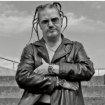Marilyn Manson's 1996 sophomore album, the Trent Reznor–co-produced Antichrist Superstar, established the Florida shock rocker as an icon of darkness, decadence and depravity. The record was bleak and outrageous, as Manson lashed out in blunt terms against God, the government and himself — and continued to do so throughout the album cycle, ripping apart bibles, cutting himself with broken glass and acting the part of a totalitarian dictator onstage.
Having apparently purged his system of pure hate, Manson toned down the violence and aggression for his follow-up, Mechanical Animals, which came out on September 15th, 1998. Influenced strongly by David Bowie and other glam-rock pioneers, the music emphasized melody and sentimentality over sheer volume and unfiltered rage. Manson wore different colored contacts to make his eyes look like Bowie's and was depicted on the album cover with fiery red hair and prosthetic breasts, embracing the type of otherworldly androgyny Bowie exhibited in his Ziggy Stardust era.
"A lot of the glam music that was so great in the Seventies was a huge inspiration — the Eno period of Bowie and T. Rex and the Sweet," he said shortly before Mechanical Animals was released. "And so were some bands that kind of crossed all of that together like Electric Light Orchestra and Queen. We didn't set out to translate any specific thing, we just wanted to make a very theatrical and bombastic record, and not be afraid to be over the top or pretentious because I think that's what rock & roll is supposed to be."
Manson may sing, "Rock! Is deader than dead," on Mechanical Animals, but in truth, the record was a main-line shot of adrenaline right into the heart of rock & roll, and while the album was polarizing at time to the musician's existing goth-kid fan base, it has since been recognized as one of his best, if not his single greatest LP. Here are 10 more things you likely didn't know about Mechanical Animals.
1. One of Marilyn Manson's biggest inspiration for Mechanical Animals was moving to Hollywood
After Antichrist Superstar came out, Marilyn Manson and his then–creative partner, bassist and guitarist Twiggy Ramirez, moved to Hollywood, where they marveled at the surreal parade that marched by their apartment. "It was like landing on another planet, and I became very fascinated with the idea of trying to assimilate in an unwelcome culture," Manson said. "When I first came here, I watched the film Fantastic Planet, and a lot of ideas that inspired the album kind of flowed from there. The decadence and the irony of Hollywood inspired it, and it was [me] finally having emotions that really made this album come to life. I wrote a lot of this record looking out my window down on Hollywood and it was almost like another planet. Antichrist Superstar was about stripping everything away, and having no use for emotions. After writing the book The Long Hard Road Out of Hell, I felt almost like a kid again. Everything was over-sensitized, and the simplest, little things in life now became more painful and more enjoyable."
2. With Mechanical Animals, Manson wanted to prove that Trent Reznor hadn't puppet-mastered his vision and success
When Manson started getting recognized, Nine Inch Nails main man Trent Reznor took the young rocker under his wing, signed him to his label Nothing Records and produced Antichrist Superstar. Such hands-on involvement caused some fans to view Manson as a vehicle for Reznor. "This album not only proves that we can do things on our own, it proves that what we've done in the past was still very much our own creation," said Manson, who co-produced Mechanical Animals with Michael Beinhorn (Soundgarden, Hole) and Sean Beavan (NIN, Guns N' Roses). "Trent is a very heavy-handed producer, but I've always been my own songwriter and I just think this time I wasn't afraid to really go for it and not hold anything back — not be afraid of what people would think if it doesn't sound like what they think Marilyn Manson should sound like or what's gonna get played on the radio. I just wanted to write songs that I'd like to listen to myself. I can sit down and listen to this record and enjoy it.
3. The band wrote a lot of songs for the album
Manson may have been coming off the success of Antichrist Superstar, but they never suffered writers block and were never at a loss for words or melodies. "I had in my mind and in my notebook what I wanted to say and we sat down in my house and wrote about 14 songs in 14 days, and we just kept writing," he said. "So we ended up writing a lot of extra songs and I just focused on the ones I felt were most important to the themes of the record. It went very quickly, the writing process. I'd say it took five months total."
4. Smashing Pumpkins' Billy Corgan encouraged Manson to pursue the creative left turn he took with Mechanical Animals
Before Manson chose Beinhorn and Beavan to co-produce Mechanical Animals, he had initially worked on some tracks with the Dust Brothers, and Smashing Pumpkins frontman Billy Corgan visited the studio to check in on their progress. "Billy did inspire us to take a chance," Manson told Rolling Stone in 1998. "We played him the first couple of songs and he said, 'This is definitely the right direction, but if you're gonna do this, go all the way with it. Don't just hint at it.' And that gave me the incentive. He's like a big brother, sort of."
5. Falling in love with actress Rose McGowan bought out Manson's romantic side on the album
Mechanical Animals can be interpreted on a variety of levels, one of which was strongly shaped by Manson's relationship with Rose McGowan. Suddenly, he wasn't reveling in perversity and provocation, but was instead exposing a heretofore largely unexplored sensitivity and vulnerable. "Falling in love definitely affected my outlook on life," he admitted. "In one way, the record is a metaphor for that story. I think this is the side you'll see of me writing anything that has to do with emotions. It focuses my attention on one person, but it doesn't change the way I feel about the rest of the world. If I believe in someone and I love someone, I'm going to put all that into them, I'm not going to waste it on anyone else. But that doesn't change my opinions or my beliefs so there are these different sides of me in the album. With Rose, it's a very faithful relationship. I think it's just a matter of ... I've been at this point in my life and I hope it stays this way, but there are no guarantees in life."
Of course, things didn't ultimately work out with McGowan, who broke off her engagement to Manson in early 2001, citing "lifestyle differences." Somewhat prophetically, on the album, Manson's love object turns out to be a drug, not a person at all. "The name I gave to the thing I was in love with was Coma White," he explained to Rolling Stone. "It starts as the name of a girl I'm in love with, then ends up to really be a drug I've been taking. So I'm not really sure what I'm in love with."
6. The band wanted Mechanical Animals to represent "the polar opposite" of Antichrist Superstar
While Antichrist Superstar came from the perspective of an angry antagonist — a "destroyer," as Manson described the persona to Kerrang! — whose contempt for convention and ignorance stripped him of the ability to feel, the protagonist in Mechanical Animals suffers from a very different condition. "Mechanical Animals comes from the standpoint of being the only people in the world with feelings rather than the only people without, so it's almost the polar opposite of Antichrist Superstar," he said. "I think a lot of people will think this is a sad record, or depressing at times, and other times it's very cock-sure and cynical, but that's just really what my personality is and I've tried to just lay it all out there without sounding too much like I should be in the Lilith Fair," he joked, referencing the all-female singer-songwriter-heavy summer festival organized by soft-rock star Sarah McLachlan.
7. In fact, Manson was bored with direction of Antichrist Superstar and was actively mocking himself with Mechanical Animals
"I'm bored with that," Manson said to Rolling Stone, when asked why he was largely abandoning the industrial-metal sound that had brought him so much success. "Everything you hear nowadays is an offshoot of NIN, Marilyn Manson, Ministry. There's just no great rock albums anymore. There's a lot of rock music out there, but it's very bland and disposable."
But Mechanical Animals was not just intended as a shot at the sad state of rock music, as Manson saw it; it was also meant as a shot at himself and at what fame and commercialism had done to dilute his original vision. "Mechanical Animals was to represent the point where the revolution get sold out, a hollow shell of what the essence of Marilyn Manson was," he explained to Rolling Stone in 2000. "It was a satire, and a lot of people interpreted it as 'This is what he really is.' I was making a mockery of what I was, taking a shot at myself."
8. There are "two different bands" on Mechanical Animals
Through his alter-ego on the record, the androgynous space alien Omega, Manson created different vantage points that drove the direction of the songs. "There's very much two sides to the album," he explained. "Seven songs are literally the more cynical commentary that people see in me and the other seven are more of my interior dialogue, what I'm really thinking. So it's what are people thinking of me versus what am I thinking of me? And those two different personalities are expressed with two completely different sounding bands, almost. There's almost two different bands on the record. One of them is Marilyn Manson and one of them is Mechanical Animals, and that's the more cynical side."
9. Manson did, in fact, like the drugs when he recorded Mechanical Animals. He actually liked them even better than when he was making previous albums.
It's no secret that Manson and his bandmates were using large quantities of weed, cocaine, pills and hallucinogens when they wrote and recorded their first two records. At the time, the indulgence came from a reckless place born of insecurity and rebellion. The frontman threw crazed tantrums and suffered more than a few injuries as a result, as did his fellow musicians. During the making of Mechanical Animals, however, Manson used drugs as a tool for creativity, not a means of destruction, he said. "It's only when you're in a weak frame of mind that drugs can really hurt you," he explained. "If you're a competent drug user there's nothing to fear. For this album, no drugs were sought out of depression or confusion, they were just sought out of enjoyment or decadence. This record was written on drugs, it's about drugs and will most likely be performed on drugs, as well."
10. Guitarist Zim Zum split with the band after the recording of Mechanical Animals because Manson is a tough boss
Timothy Michael Linton, a.k.a. Zim Zum, was responsible for the guitar work on 12 of Mechanical Animals' 14 tracks, but after the recording of the album, he split with Manson and was replaced by John Lowery, who was previously best known for playing with Judas Priest's Rob Halford in his Reznor-approved industrial-metal project 2wo. Lowery would change his name to John 5, and eventually, after his time with Manson, find his current place in Rob Zombie's band.
So what happened with Zim Zum? According to Manson, the partying was getting in the way of productivity. "We had problems with him not showing up, and I took that as an insult," Manson told Rolling Stone in 1998. "That's just the way I am. My feelings are, if you're gonna lead a rock & roll lifestyle, don't let it affect your work. I know I can stay up all night and still come in the next day and write a song, and nothing will stop me from doing it. I expect the same from everyone else."
"If you're gonna pretend to be something," he added, "then you have to at least live up to what it is."











